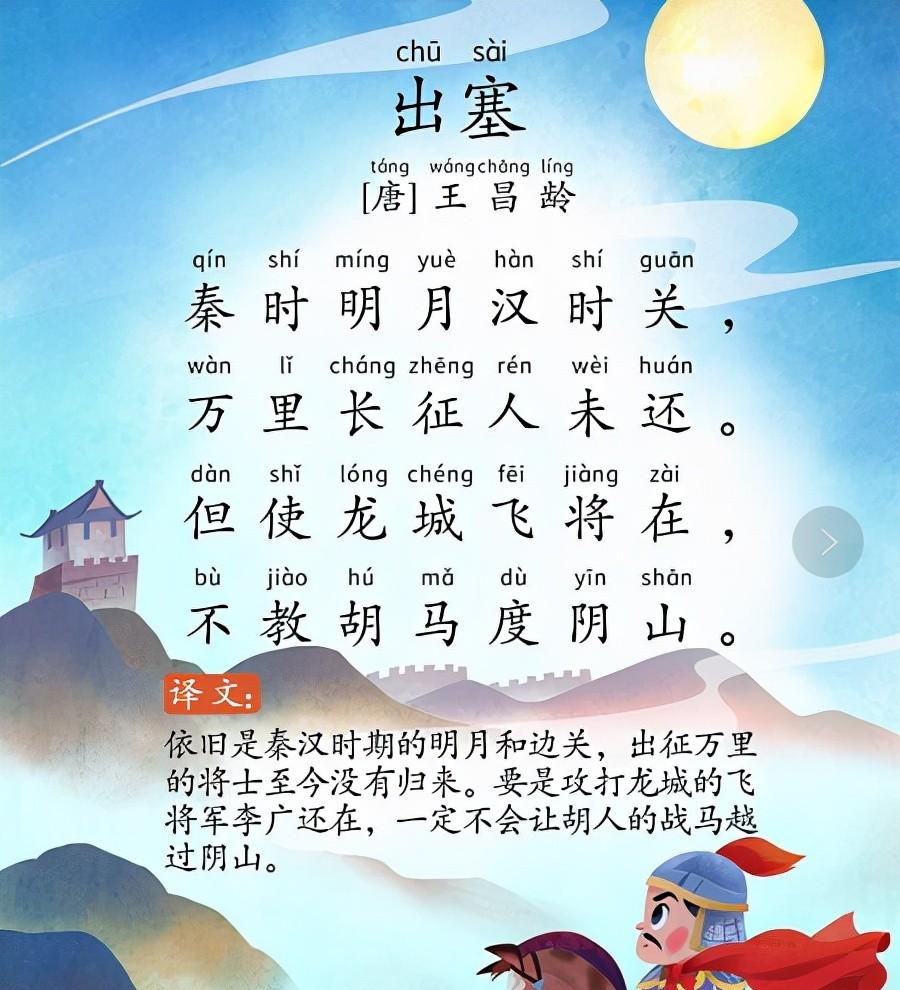Today, there are many netizens arguing on the Internet, whether the "flying general" mentioned in the poem "But the flying general of Dragon City" is Li Guang or Wei Qing?
I believe that most people have learned Wang Changling's poem "Out of the Plug" when they went to school: "Qin Shi Mingyue Han Shi Guan, the Long March people have not returned, but the Dragon City will fly in, not called Humadu Yin Mountain." In the memory of many people, when the teacher was lecturing, the "flying general" referred to the Han Dynasty military general and the flying general - Li Guang.

But in fact, in the "Battle of Longcheng" in the Han Dynasty, it was not Li Guang but Wei Qing who attacked the Xiongnu holy land of Longcheng. In the sixth year of Yuan Guang (129 BC), Emperor Wudi of the Han Dynasty personally deployed, and the Han Dynasty soldiers were divided into four routes, each leading 10,000 cavalry to attack the Xiongnu. Among them, Wei Qing went out of shanggu, Gongsun Ao came out of Dai County, Gongsun He came out of the clouds, and Li Guang went out of Yanmen. However, Gongsun Ao, Gongsun He, and Li Guang were all defeated, and Li Guang was captured by the Xiongnu, and later pretended to die before taking the opportunity to flee back. Only Wei Qing won all the way and conquered the sacred place of the Xiongnu ancestors, Longcheng, which became the first major victory of the Han Dynasty against the Xiongnu.
Was it because the teacher was wrong? I don't think so. There are three reasons: First, the mainstream view of the literati in the Tang Dynasty was to belittle Wei Qing and praise Li Guang. For example, Gao Shi, a famous border poet of the Tang Dynasty, used "Li Guang never came before the general, Wei Qing did not refuse to learn from Sun Wu" in "Sending the General Out of the Plug" to suppress "Wei" and praise "Li". Wang Wei defended Li Guang in "The Veteran General's Journey" and said, "Wei Qing is undefeated by Heavenly Luck, and Li Guang has no merit and is strange." Du Fu also used the phrase "short clothes and horses to follow Li Guang, and watch the fierce tiger die forever" in the "Three Chapters and Five Sentences of Qujiang River" to fight for Li Guang. Therefore, at that time, Wang Changling certainly could not praise Wei Qing and ignore Li Guang. Second, the great poet at that time, Li Bai, the "big v of traffic", was widely regarded as Li Guang's descendant! Li Bai, in "Gifting Zhang Xianghao", is also known as "The Longxi people of the Ben family, first of all, were Hanbian generals." As a friend of Li Bai, Wang Changling, even if he gives his friend face, how can he tout Li Guang! Third, the place where Li Guang trained his troops was called "Lu Longcheng" during the Tang Dynasty, although it was not as famous as the "Battle of Longcheng", but it also made sense to call Li Guang a "Flying General of Longcheng". Therefore, the "flying general" in Wang Changling's poem refers to "Li Guang" rather than "Wei Qing".
But from Li Bai, Du Fu, Wang Changling, Gao Shi, and Wang Wei of the Tang Dynasty to Su Yan and Lu You of the Song Dynasty, why did so many literati in the Tang and Song Dynasties praise Li Guang, whose military exploits were far inferior to those of Wei Qing and Huo? The reason is that whether it is Li Bai who is "a basil person of my generation", Du Fu who contradicts Emperor Suzong in the contradiction between Sanhe and Fang Zhen, Wang Wei, who was captured by An Lushan, or Lu You, who is always a sinner, most of them, like Li Guang, although they have a very high self-esteem and have also made some achievements, they really have no talent in politics, and they have never been valued by the emperor, so they can only create an image of Li Guang who "has great talent but cannot reuse", using this as a metaphor for his own talent. Whether it is Li Bai's "hard fighting is not Hou, the rich years are quite sad", Wen Tingjun's "Hou Yin does not hear of Li Guang, others are like tianshan mountains" or Lu You's "Sheng Xi Li Guang's famous flying general, death mu Liu Ling gave drunken Hou" on the surface sighing Li Guang, but in fact he is complaining for himself.